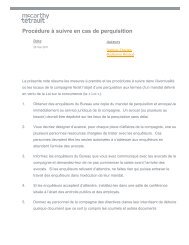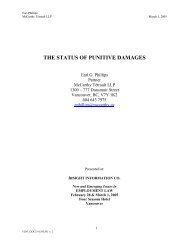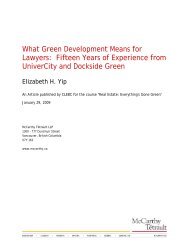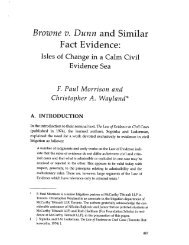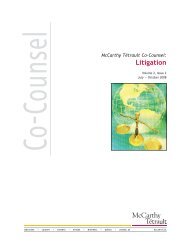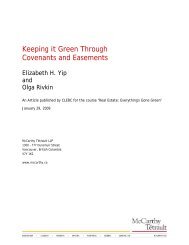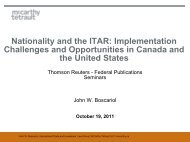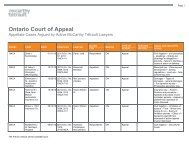The Doctrine of Public Policy in Canadian Contract Law
The Doctrine of Public Policy in Canadian Contract Law
The Doctrine of Public Policy in Canadian Contract Law
Create successful ePaper yourself
Turn your PDF publications into a flip-book with our unique Google optimized e-Paper software.
<strong>The</strong> <strong>Doctr<strong>in</strong>e</strong> <strong>of</strong> <strong>Public</strong> <strong>Policy</strong> <strong>in</strong> <strong>Canadian</strong> <strong>Contract</strong> <strong>Law</strong> 1 43<br />
<strong>of</strong> contract law as be<strong>in</strong>g <strong>in</strong>terconnected with the other valued <strong>in</strong>stitutions <strong>in</strong><br />
society. . . If the courts were required to enforce agreements that underm<strong>in</strong>e<br />
contract law the social order would conceivably dis<strong>in</strong>tegrate. . . To preserve the<br />
rule <strong>of</strong> law, and by implication the law <strong>of</strong> contract, some freedom to contract will<br />
necessarily have to be abrogated. . . Rather than pronounc<strong>in</strong>g such agreements<br />
to be '<strong>of</strong>fensive', '<strong>in</strong>jurious' or 'immoral', judges should make it clear that some<br />
agreements are not permitted enforcement because they jeopardise the very freedom<br />
that allows them to be made <strong>in</strong> the first place. . . <strong>The</strong> problem with the<br />
doctr<strong>in</strong>e <strong>of</strong> public policy is that it is equated with the 'public conscience'. At its<br />
core, however, the doctr<strong>in</strong>e is concerned with the structures <strong>in</strong> which the law<br />
operates. <strong>The</strong> doctr<strong>in</strong>e <strong>of</strong> public policy still has a valid role to play, not as a<br />
unified set <strong>of</strong> rules for when contracts will be declared illegal or void, but as a<br />
label for the reason<strong>in</strong>g judges must undertake to preserve our society. 222 [emphasis<br />
added]<br />
Judd's thesis is persuasive. It represents a far more sophisticated view <strong>of</strong><br />
the public policy doctr<strong>in</strong>e than that found <strong>in</strong> the consensus or <strong>in</strong>terstitial legislator<br />
models. However, while there is much to be said for the position that the<br />
categories <strong>of</strong> public policy are designed to preserve the essential <strong>in</strong>stitutions,<br />
ideas and structures <strong>of</strong> the liberal state and the rule <strong>of</strong> law,223 it is submitted that<br />
a more compell<strong>in</strong>g (or perhaps a simply more developed) explanation is that<br />
the categories <strong>of</strong> public policy reflect the preconditions <strong>of</strong> a just society. In a<br />
modern liberal democracy such as Canada, a just society is, among other th<strong>in</strong>gs,<br />
a society <strong>in</strong> which the relative worth <strong>of</strong> values may be adjudicated fairly, and<br />
one <strong>in</strong> which the pursuit <strong>of</strong> a given value to the detriment <strong>of</strong> any other is only<br />
undertaken <strong>in</strong> a manner that is fair (thus provid<strong>in</strong>g, to the extent possible, for<br />
their mutual co-existence).224 If this argument is correct, we should expect to<br />
f<strong>in</strong>d <strong>in</strong> the categories <strong>of</strong> public policy a series <strong>of</strong> values that are necessary for<br />
these characteristics to exist.<br />
222 Judd, supra note 19 at 708-709 and 711.<br />
223 One benefit <strong>of</strong> Judd's view (and <strong>of</strong> the theory adopted <strong>in</strong> this paper) is that it allows for<br />
a harmonization <strong>of</strong> the broad, distributive concerns <strong>in</strong>volved <strong>in</strong> the public policy doctr<strong>in</strong>e<br />
with the private, corrective nature <strong>of</strong> contract law. If the purpose <strong>of</strong> the public policy<br />
doctr<strong>in</strong>e is to preserve the rule <strong>of</strong> law (or, even more broadly, the preconditions <strong>of</strong> a just<br />
society), the pr<strong>in</strong>ciples <strong>of</strong> public policy form part <strong>of</strong> the "rules <strong>of</strong> the game" which must<br />
be acceded to by private contract<strong>in</strong>g parties (perhaps as implied terms) <strong>in</strong> order for their<br />
arrangements to have any legal force.<br />
224 This work<strong>in</strong>g def<strong>in</strong>ition <strong>of</strong> a "just society" has been <strong>in</strong>fluenced by John Rawls, Justice<br />
as Fairness: A Restatement (Cambridge, Mass.: Harvard University Press, 2001) at 27<br />
[Rawls], who states that: "[a]n essential feature <strong>of</strong> a well-ordered society is that its public<br />
conception <strong>of</strong> political justice establishes a shared basis for citizens to justify to one<br />
another their political judgments: each cooperates, politically and socially, with the rest<br />
on terms all can endorse as just." See further Rawls, at 45, describ<strong>in</strong>g the function <strong>of</strong> the<br />
basic rights and liberties. It is also reflected <strong>in</strong> the judicial approach to s. 1 <strong>of</strong> the Charter,<br />
which requires that any restriction imposed upon a Charter value for the purpose <strong>of</strong><br />
pursu<strong>in</strong>g another value be "rational" and "m<strong>in</strong>imally impair" the former.



